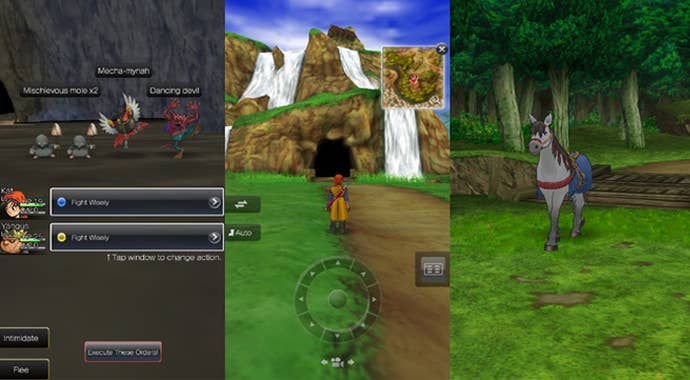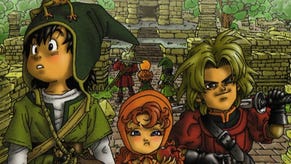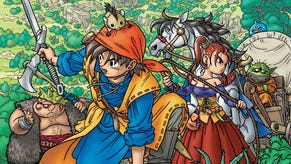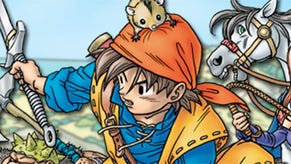Dragon Quest VIII iOS Review: Itty-bitty Living Space
An expensive, choppy, claustrophobic, and ultimately disappointing port.
This article first appeared on USgamer, a partner publication of VG247. Some content, such as this article, has been migrated to VG247 for posterity after USgamer's closure - but it has not been edited or further vetted by the VG247 team.
Dragon Quest VIII still looms large in the mind of a lot of Japanese RPG fans. It's the one game that managed to capture the sprawling grandeur of a genre that had previously been limited to simple polygonal maps and 16-bit sprites. Some would argue that it was all downhill after that.
To see Dragon Quest VIII on the mobile phone now, nearly a decade after its original U.S. release on the PlayStation 2, is something of a revelation. It's a mark of both how far mobile gaming has come, and how far it has to go. Because as nice as Dragon Quest VIII looks after all these years, it's a pretty flawed port. The original game was sort of the opposite of what you would expect from a mobile game. Like the rest of Dragon Quest, it was a deeply traditional RPG with no qualms about relying on outdated concepts like random encounters. It was slow and thoughtful; content to let you drink in its lavish world without pushing you along too much. It was certainly a far cry from the Candy Crushes of the world.
And to the credit of the mobile port, it manages to capture at least part of Dragon Quest VIII's charm. The sight of Munchie, the Hero's faithful mouse pet, skittering through the grass and into Trode's pocket brings a lot of memories rushing back. It brings with it a feeling that I haven't had since seeing Final Fantasy VII on the PSP for the first time—the excitement of playing a faithful port of an old-favorite RPG that was highly advanced for its time. And strictly speaking, Dragon Quest VIII is a complete port of a hundred hour RPG, absent the orchestral soundtrack and the voice acting.
It's also a deeply strange port though. Going in, I expected to spend the bulk of my time playing Dragon Quest VIII on my iPad 4; but as it turned out, I was much more comfortable playing on my iPhone 5 than anywhere else. For one thing, it looks sharper on the iPhone's smaller screen, which helps make the new cel-shading pop while masking some of the older, muddier background textures. But there's also the fact that it's stuck in portrait mode, which makes it easy to play DQVIII with one hand, but does little to take advantage of the iPad's larger screen.
Personally, I found that Dragon Quest VIII's portrait mode pretty much ruined the experience for me. Only the obligation of continuing with the review kept me from shutting it immediately and never playing it again. The original Dragon Quest VIII was a beautiful game that was clearly meant to be played on a large TV. I understand that compromises were inevitable for a mobile port, but it is mind-boggling that landscape mode is not an option. It should have looked so good on the iPad. Instead, the forced perspective makes Dragon Quest VIII's grand landscapes feel cramped, cluttered, and even claustrophobic—not a feeling I ever expected to have playing Dragon Quest VIII.
And even with these technical limitations, the iOS version of Dragon Quest VIII is still extremely inefficient. Though I was mostly able to enjoy it on my iPhone 5, it was at the expense of a consistently bad framerate that hovered between 20 and 25 FPS. It was even somewhat choppy on the iPhone 5S, which is remarkable given both the age of Dragon Quest VIII and the fact that it boasts a 64-bit processor. Obviously, iPhone 4S users need not apply. At this point, I'm kind of wondering if it'll even run well on the iPhone 6.
I suppose you could say that graphics aren't everything. Dragon Quest VIII remains a rock solid RPG that wields its simple but strong RPG mechanics to great effect. It hardly suffers on the iPhone, where battles can be completed quickly by executing "Fight Wisely" orders and watching the party go at it. The actual navigation can be akward at times owing to the small size of the screen, but the on-screen joystick is adequate for moving about the world. Controlling the camera is likewise easy, merely requiring that you move your thumb down and swipe left or right.

My main objection to this version of Dragon Quest VIII—other than the fact that it's a technically questionable port and really expensive ($20) to boot—is that it doesn't capture the appeal of the original game. It's hard enough to effectively render that massive world on a tiny mobile screen; to see it cropped into oblivion in portrait mode is both depressing and absurd. It's just not a port that I can recommend. Even if you're looking for a robust mobile RPG, there are better options out there, like The World Ends With You. Give this one a pass.
The Breakdown
- Visuals: The character models are certainly sharper than before. The same cannot be said for the backgrounds, which feature textures that look muddy on larger screens. Being stuck in portrait mode ruins almost everything.
- Music: Say goodbye to the PS2's ringing orchestral soundtrack. Ditto to the voice acting. It's kind of expected for a mobile port, but it's another instance of DQVIII's grandeur taking a hit.
- Interface: The battle menus could stand to be a little bigger, but otherwise the UI is clean and relatively unobtrusive. The one thing that can be said for portrait mode is that it makes it easy to play the game one-handed thanks to the thumbstick and touchscreen camera combo.
- Lasting Appeal: Dragon Quest VIII is one long RPG, so if you end up enjoying this port despite its flaws, it'll keep you busy for quite a long time.
ConclusionOne of the goals of any port is to capture the appeal of the original game on a new platform. Ideally, it will even elevate it in some way, either with new content or improved design. Unfortunately, Dragon Quest VIII does the opposite, sacrificing a lot of what made the original game so memorable in its quest to fit on the mobile platform. It's playable, but only just. It certainly does not come recommended.








